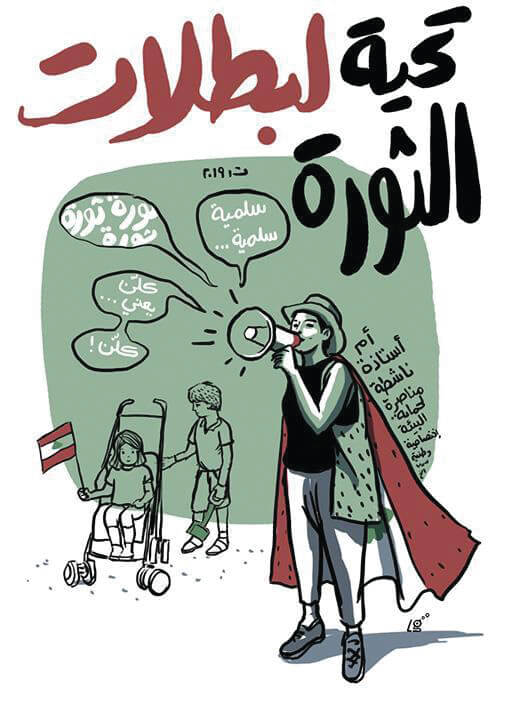«This will teach our children what they will not learn in a classroom,» Lina Daouk-Öyry, an Associate Professor of Organizational Behavior at the Olayan School of Business (OSB) at AUB, and a mother of two, told An-Nahar. «I am the mother of two non-Lebanese children who do not have the right to the Lebanese nationality, despite being born and raised in Lebanon,» added Daouk-Öyry, who is married to a Finnish gentleman.
Daouk-Öyry was not alone in protesting for her rights to pass the nationality to her children and spouse. Sylvana Ghandour-Barrois, a mother of two who is married to a French gentleman, also joined the protest. «I am here for the rights of my children. They are both young, and they have a lot of questions at this stage in their lives. They are starting to question everything,» she said.
But the right to the nationality was not the only reason why Daouk-Öyry and Ghandour-Barrois turned up for the protests. They were part of a larger circle of parents who joined every morning the protests and participated in the cleaning initiatives, as well as the Storytelling and Arts N’ Crafts initiative, which, through fun activities and techniques that center around the concept of patriotism, aim to instill a sense of citizenship in the children.
«These initiatives are very important educational experiences for the children. It’s important for the parents to let their children participate in the revolution because this is the revolution that will shape their future,» says Daouk-Öyry, who co-organizes several classes for the children.
However, not all parents have the luxury to participate in «the tent», as it is now known- but that does not deter them from showing up with their children and heading to the square that is closest to them.
«It’s the first time I hear of a tent dedicated to children’s activities, and I wish we had such a tent in Tripoli,» 38-year-old Fatme Al Dirani, mother of three, told An-Nahar. «But that will not stop me from bringing my children with me every day to [the protests] and from explaining to them what is it exactly that we are fighting for.» Al Dirani admits that explaining the revolution to her children was «no easy feat», but the urge to have them understand her situation was stronger than the urge to «leave them as they are, with no clue of what’s happening around them.» Her son Ahmed, who is seven, had some basic questions that she found difficult to answer. «He asked me questions like «what is a revolution?» and «what are we fighting for?» and «why can’t we swim in the sea?» These were all difficult to answer.»
In fact, almost all parents that An-Nahar spoke to stressed the importance of using games and special techniques to bring the concept of the revolution closer to their children.
Faten Merashly, the mother of a 17-year-old son who suffers from autism, used charts and cardboards to explain to her son what the protests were all about. «Even if Mahmoud [my son] has autism, that doesn’t mean he can’t conceptualize what a revolution is,» Merashly, who famously brought her son with her to the revolution, told An-Nahar.
«When people stand up for their rights, they unconsciously teach their children to do the same, which is a beautiful thing,» Daouk-Öyry said.
School and university students also took part in the protests. If children needed any guidance in interpreting what a revolution is, then school students certainly took the bull by the horns, taking to the streets and marching with the older university students from one university to another, chanting slogans of anti-corruption and anti-government.
Ahmed Fallah, a 13-year-old sixth-grader, said to An-Nahar that his dad has to work two jobs so he can get an education, which «wasn’t fair». «My father works a lot and the [managers] barely pay him,» Ahmed told An-Nahar. «Why must he work so hard to educate me? Education must be free.»
It should be noted that primary education is free and compulsory in public schools by law in Lebanon. Another student, 14-year-old Ali, complained of the tangible difference in quality education between the public and private schools. «I’m currently in a public school,» Ali told An-Nahar. «I always hear that private schools are better. Why must it be like that? Public schools belong to the government- they should be stronger.»
16-year-old Rania, who resides in Sidon and who did not wish to be known by her real name, told An-Nahar that, on Wednesday, the tenth, eleventh and twelfth-grade students met outside her school at 7:30 am and headed to the city's main protest area, the Elia Crossing. «We are on the streets to provide ourselves with a better future because most of us are graduating without any job opportunities and are forced to leave the country,» she told An-Nahar.
Many of Rania’s friends passionately echoed her sentiments by marching across all of Lebanon, electrifying the country with their chants and slogans. «Thawra! Thawra! Thawra!» They chanted.
As for university students, their requests centered around finding work in a country that has one of the highest employment rates in the Arab world. «All what we are asking for is the right for a decent job after graduation,» 20-year-old Qussai told An-Nahar angrily. «We have the right to a secure future where we can help our families and not be a burden to them.»
The student’s voices did not go unheard, as several media outlets named their two-day-protest as one of the largest student demonstrations to go down in Lebanon’s history.
